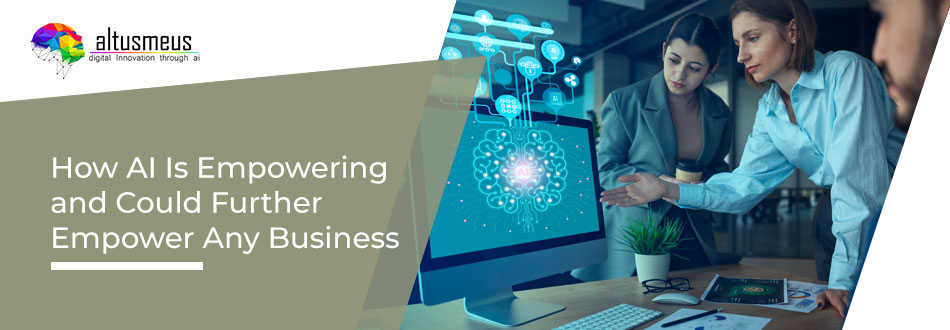Much like the printing press, wheel, and computer did in their respective eras, AI has emerged as a transformative force in today’s world. Just as these inventions served as tools to enhance human capabilities and efficiency, AI has the potential to revolutionize businesses across the board. In this blog, we’ll explore how AI has the capacity to empower businesses, driving efficiency and profitability to new heights.
The present state of AI lacks human-like intelligence or consciousness. Nonetheless, it excels in processing extensive datasets, recognizing patterns, deriving meaningful insights, and aiding businesses in tasks beyond human capability.
Businesses vary significantly in their industry, operations and nature, which means that an AI solution suitable for one may not be appropriate for another due to differences in their business models and requirements. However, as mentioned earlier, AI has the potential to empower any business, including yours. In the following sections, we will explore how AI is and can benefit various types of businesses in different industries.
E-commerce and retail
- Personalized Shopping: AI can assist businesses in analyzing customer data, allowing them to understand customer preferences and provide personalized recommendations to each customer based on the collected data. Amazon, for example, is already doing this.
- Inventory Management: For retail companies, managing inventory poses significant challenges. However, by implementing AI algorithms, businesses can optimize their inventory levels. This not only helps prevent issues like overstocking and stockouts but also leads to cost reductions and improved profitability. In some platforms, AI algorithms are used to manage inventory.
- Customer Service: Another challenge that retail companies, especially online retailers, face is the influx of product-related and after-sales service inquiries, which often leads to high costs associated with hiring dedicated customer service staff. However, AI can revolutionize the customer service provided by these companies. It can operate 24/7, resolving issues efficiently and effectively. AI-powered chatbots are used by many big companies.
Healthcare
- Medical Diagnosis: Diagnosing illnesses or conditions typically involves doctors asking patients about their symptoms and reviewing test reports to create a pattern of information for diagnosis. However, this process is not always 100% accurate. With the advent of AI, there is potential for a revolution in medical diagnosis. AI can analyze various patient-related data, including report data, images, and other information, leading to more precise diagnoses.
- Drug Discovery: Big pharmaceutical companies can expedite the drug discovery and development process using AI, leveraging its capabilities in pattern recognition and analysis of vast datasets.
- Patient Care: Big Hospitals can establish AI-powered systems to develop patient care systems that enable remote monitoring. In certain situations, medical staff may not need to intervene, as AI can autonomously assess when and how to improve patient care.
Finance
- Risk Assessment: With the large amount of data AI can help banking institutions find all the risks related to giving credit to any person or company by checking their financial history and records and it can also help banks in detecting fraudulent activities and improve overall bank operations.
- Trading with AI: With the assistance of AI, investors can employ artificial intelligence algorithms to autonomously make trading decisions on their behalf, programming the algorithm on how to act in various situations. There are a few apps for trading on the Google Play Store and Apple App Store that use AI algorithms.
Manufacturing
- Maintenance Prediction: AI algorithms with the help of sensors excel at identifying patterns in the operation of machines, distinguishing between optimal and suboptimal conditions. Leveraging this capability, AI can predict the ideal maintenance schedule, minimizing downtime to the greatest extent possible.
- Quality Control: Product quality is one of the most important things for business and with the help of AI and sensors and data of defects, standard and substandard products AI can maintain the quality of products.
- Marketing and Advertising: By harnessing extensive customer data encompassing details like names, ages, occupations, locations, and preferences, AI empowers marketers to craft precise marketing campaigns. Additionally, it streamlines advertising automation and enhances the effectiveness of targeted advertising efforts.
- Content Creation: AI extends its capabilities to content creation, covering everything from product labels, brand names, slogans, and marketing messages to written content, infographics, video production, etc. While AI is still in its early stages, it already exhibits remarkable efficiency, with even greater potential on the horizon.
Transportation
- Autonomous Vehicles: This is not science fiction now it is reality and with the help of AI we can create self-driving cars, trucks, motorbikes, trains and other vehicles. This will revolutionised the transportation system by improving the efficiency and reducing the cost by many fold.
- Route Optimization: Traffic congestion and poor road conditions pose significant challenges to timely and damage-free transportation. However, through the integration of AI and sensors, route optimization becomes feasible, enabling drivers to follow efficient paths and expedite the transportation process.AI optimizes transportation routes for efficiency. It is happening in some places, such as New York City, where there are smart traffic lights that control traffic intelligently with the help of AI and sensors.
Education
- Personalized Learning: Schools and other educational institutions can utilize AI to teach students specific subjects. AI can customize educational content and teaching styles based on each student’s current knowledge and their ability to grasp new concepts.
- Administrative Tasks: AI can automate repetitive tasks in education, assisting educators with administrative work and enhancing their efficiency and effectiveness in teaching.
Energy
- Management of the grid: AI can analyze patterns of energy consumption in a city by examining historical and current data. With this information, it can optimize energy distribution and consumption.
- Energy Efficiency: With the assistance of sensors, AI can detect opportunities to adjust energy consumption, effectively reducing waste and optimizing energy usage, thus minimizing costs.
Hospitality and Travel
- AI-powered booking platform: The hospitality industry can create AI-powered platforms for booking that could revolutionize travel planning. These platforms would use provided data to recommend ideal destinations and seamlessly handle bookings, from flights to hotel rooms and local sightseeing trips. While this concept has yet to fully materialize, it holds promise for the future, benefitting both the hospitality and travel sectors, from hotels to airlines.
Real Estate
- Property Valuation: AI algorithms can significantly expedite and enhance the accuracy of property valuation in the real estate sector. All that’s required is providing comprehensive property data, including details such as location, rate, area, connectivity, proximity to future projects, construction date, parking space availability, and more.
- Investment Decisions: AI algorithms can assist real estate investors by analyzing market data and offering informed investment recommendations.
Conclusion
AI is a highly prominent technology in today’s landscape, with a plethora of AI-powered tools and platforms making significant contributions across various industries. While we have discussed some of the ways AI can empower companies, there is much more to explore regarding its current and potential impact on businesses. We haven’t delved into AI’s role in payroll software, platforms like ChatGPT, or applications like Adobe’s Firefly.
However, it’s clear that AI holds tremendous potential for enhancing businesses and streamlining operations. As AI continues to evolve, it will undoubtedly play an increasingly significant role in simplifying and improving the work of professionals across diverse fields.





